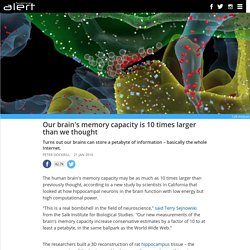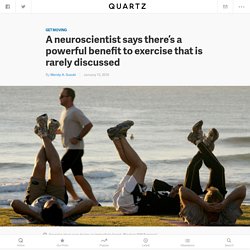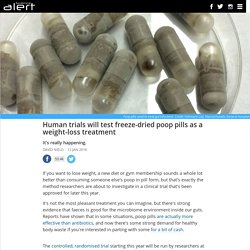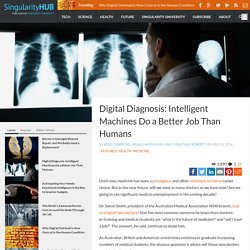

Ecco i benefici dei vaccini, misurati e dimostrati. Fighting Cancer. Our brain's memory capacity is 10 times larger than we thought. The human brain's memory capacity may be as much as 10 times larger than previously thought, according to a new study by scientists in California that looked at how hippocampal neurons in the brain function with low energy but high computational power.

"This is a real bombshell in the field of neuroscience," said Terry Sejnowski from the Salk Institute for Biological Studies. "Our new measurements of the brain's memory capacity increase conservative estimates by a factor of 10 to at least a petabyte, in the same ballpark as the World Wide Web. " The researchers built a 3D reconstruction of rat hippocampus tissue – the memory centre of the brain – and in doing so, discovered something strange. Synapses, the junctions that form between neurons, were being duplicated in about 10 percent of cases. "We were amazed to find that the difference in the sizes of the pairs of synapses were very small, on average, only about 8 percent different in size," said Tom Bartol, one of the scientists.
Extensive twin study finds no link between marijuana use and IQ decline in teens. The largest ever longitudinal twin study involving more than 3,000 adolescents from around the world has found little evidence to suggest that adolescent marijuana use has a direct effect on intellectual decline.

The study analysed the results of two separate studies that traced the lives of American adolescent twins over a decade, and both found that teens who engaged in regular marijuana use lost no more IQ points over time than their non-using twin siblings. The perceived link between dwindling intelligence and marijuana use can most recently be traced to a 2012 study by Duke University researchers, who concluded that frequent and heavy marijuana use is likely associated with a decline in IQ.
But a follow-up study - also published in the Proceedings of the National Academy of Sciences - revealed that many confounding factors that have also been linked to IQ decline, such as cigarette and alcohol use, low socio-econimc status, and mental illness, were never accounted for. A neuroscientist says there’s a powerful benefit to exercise that is rarely discussed.
When I was about to turn 40, I started working out regularly after years of inactivity.

As I sweated my way through cardio, weights, and dance classes, I noticed that exercise wasn’t just changing my body. It was also profoundly transforming my brain—for the better. The immediate effects of exercise on my mood and thought process proved to be a powerful motivational tool. Cannabis and Spinal Cord Injuries. First children diagnosed in 100,000 Genomes Project. Three British men were the first people to be diagnosed with rare diseases last year thanks to the 100,000 Genomes Project.

Now the project has achieved another first -- the first children to be diagnosed. Thanks to genome sequencing, Georgia Walburn-Green and Jessica Wright have now been informed of the exact genetic changes responsible for their previously undiagnosed conditions -- giving them wider treatment options and further support. Their diagnosis may also open the door to other undiagnosed patients with the same diseases.
Cybathon 2016: Games will reward athletes and technology. Human trials will test freeze-dried poop pills as a weight-loss treatment. If you want to lose weight, a new diet or gym membership sounds a whole lot better than consuming someone else's poop in pill form, but that's exactly the method researchers are about to investigate in a clinical trial that's been approved for later this year.

It's not the most pleasant treatment you can imagine, but there's strong evidence that faeces is good for the microbiome environment inside our guts. Reports have shown that in some situations, poop pills are actually more effective than antibiotics, and now there's some strong demand for healthy body waste if you're interested in parting with some for a bit of cash.
The controlled, randomised trial starting this year will be run by researchers at the Massachusetts General Hospital. Digital Diagnosis: Intelligent Machines Do a Better Job Than Humans. Until now, medicine has been a prestigious and often extremely lucrative career choice.

But in the near future, will we need as many doctors as we have now? Are we going to see significant medical unemployment in the coming decade? Dr. Saxon Smith, president of the Australian Medical Association NSW branch, said in a report late last year that the most common concerns he hears from doctors-in-training and medical students are “what is the future of medicine?” And “will I have a job?”. As Australian, British and American universities continue to graduate increasing numbers of medical students, the obvious question is where will these new doctors work in the future? Will there be an expanded role for medical professionals due to our ageing populations?
Driving down the costs All governments, patients and doctors around the world know that healthcare costs will need to reduce if we are to treat more people. Machines vs humans. Thalidomide 50 years on: 'Justice has never been done and it burns away' She is planning to move from her tiny flat to a bungalow in Haywards Heath because she needs an extra bedroom for a carer to sleep in, and a bigger bathroom so a helper can be present.

The move will cost hundreds of thousands of pounds. The bungalow will need electric doors and windows, a remote-controlled toilet and bath with hoists, and every light switch, surface and cupboard set at precisely the right height. There will have to be room for her four motorised chariots (two for inside, two for outside), and secure parking for her specially adapted Ford Transit van. Like Mercer, most of Britain’s 468 surviving thalidomiders are suffering musculoskeletal deterioration and chronic pain as they age. Their spines and joints are wearing out after decades of performing mundane tasks with their teeth, toes or stumpy arms.